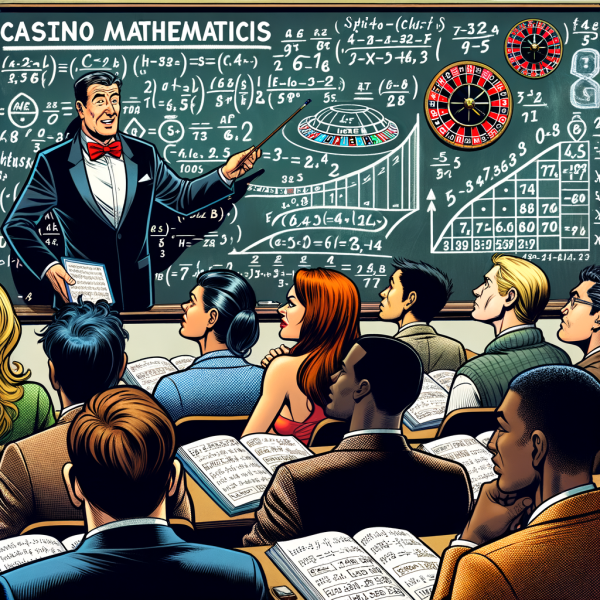Understanding the Role of Probability in Casino Games
Probability is the cornerstone of all casino games, providing the mathematical foundation upon which odds are calculated. In essence, probability measures the likelihood of a particular outcome occurring in a game. For example, in a simple coin toss, there are two possible outcomes—heads or tails—each with a probability of 0.5. This clear-cut simplicity contrasts sharply with the more complex probability structures found in casino games, where multiple factors, such as player strategies and game rules, come into play.
In games like poker or blackjack, players must assess the probability of drawing specific cards or achieving particular hands. Understanding these probabilities can significantly enhance their strategies, allowing them to make decisions that maximize their chances of winning. For instance, in blackjack, players calculate the probability of their next card being favorable based on the cards already dealt. This mathematical reasoning empowers players to make informed decisions rather than relying solely on instinct or luck.
Conversely, the complexity of probability in games like roulette can be daunting. The wheel has 38 pockets (in American roulette), making the odds of landing on a particular number 1 in 38 for a single bet. However, with multiple betting options—such as red or black, odd or even—the effective probability of winning varies. Players need to understand that while some bets appear safer, they often come with lower payouts due to their higher probability of winning.
Overall, grasping the role of probability in casino games is crucial for both players and casinos. While players seek to use probability to enhance their chances of winning, casinos rely on these mathematical principles to create games that are profitable over the long term.
The Importance of House Edge in Game Design
The house edge is a critical concept in understanding casino games, representing the mathematical advantage that the casino holds over players over time. This edge ensures that, while players may experience short-term wins, the casino is designed to be profitable in the long run. For instance, in American roulette, the house edge is approximately 5.26%, meaning that for every $100 wagered, the casino expects to keep about $5.26. This percentage varies by game and is a key factor in its design.
The house edge is meticulously calculated based on game rules, payouts, and probabilities. In games like slot machines, the design often includes a programmed return-to-player (RTP) percentage, which indicates how much the machine will pay back to players over time. For example, a slot machine with an RTP of 95% means that, theoretically, for every $100 wagered, it returns $95 to players. However, the remaining 5% constitutes the house edge, ensuring the casino’s profitability.
Understanding the house edge allows players to make informed choices about which games to play. Lower house edges correspond to better odds for players, making games like blackjack and video poker more favorable than others. Additionally, casinos often advertise games with the lowest house edge to attract players, highlighting the importance of this concept in marketing strategies.
Moreover, the house edge influences game design by encouraging casinos to create games that enhance player engagement while simultaneously ensuring profitability. By balancing the excitement of risk with a manageable house edge, casinos can create an experience that keeps players coming back while maintaining their financial stability.
How Odds Influence Player Decisions and Strategies
Odds play a pivotal role in shaping a player’s decisions and strategies in casino games. When players understand the odds associated with different bets, they can make more calculated choices during gameplay. For example, in baccarat, players can bet on the banker, player, or a tie. The odds of winning vary significantly, and knowledgeable players often focus their strategies on the bet with the best odds—the banker’s bet, which typically has a lower house edge.
In table games, odds also dictate betting strategies. For instance, in blackjack, the odds of being dealt a natural 21 (an ace and a ten-value card) are relatively low, which influences how aggressive a player might choose to be in raising bets. Players who are aware of these odds may adjust their strategies based on their position in the game, the dealer’s visible card, and the remaining deck composition.
In addition, the psychological aspect of odds cannot be understated. Players often gravitate toward bets that are perceived as having better odds, even if the actual financial outcome differs. This phenomenon can lead to irrational behaviors, such as chasing losses by increasing bets in games with unfavorable odds. Knowing the odds can help players avoid these pitfalls and foster more rational decision-making.
Ultimately, the influence of odds extends beyond mere calculation; it shapes the entire gambling experience. Players who understand odds can engage in more strategic gameplay, and casinos benefit from the structured nature of bets that keep players entertained and coming back for more.
Analyzing Game Types: Slots, Table Games, and More
Casino games can be broadly categorized into slots and table games, each with distinct mathematical frameworks and odds structures. Slots are typically governed by a random number generator (RNG), which determines outcomes based on probability but lacks skill-based elements. The odds in slot games are calculated based on the number of possible combinations of symbols on the reels, and each spin operates independently of previous spins, making outcomes purely chance-based.
In contrast, table games like poker, blackjack, and roulette incorporate both skill and probability. Players can exert influence over the outcome through strategic decision-making, such as when to hit or stand in blackjack. The mathematical odds associated with each action are crucial for players aiming to minimize the house edge and maximize potential winnings. For example, understanding when to double down in blackjack can significantly affect a player’s overall success.
The payout structures also vary between game types, affecting player choices. For instance, while slot machines may offer large jackpots due to numerous symbols and combinations, table games often have lower payouts but higher odds of winning. This dynamic can create a different gaming atmosphere, influencing how players perceive risk and reward.
Additionally, the rise of online casinos has introduced hybrid games that blend elements from both slots and table games, further complicating the landscape of gambling odds. Understanding the nuanced differences between game types is essential for players aiming to optimize their strategies and improve their overall experience in the casino environment.
| Game Type | House Edge | Key Odds Calculation | Player Influence |
|---|---|---|---|
| Slots | 2% – 10% | Based on symbol combinations | Minimal (RNG) |
| Blackjack | 0.5% – 1% | Probability of winning hand vs. dealer | High (strategic decisions) |
| Roulette | 2.6% – 5.26% | Odds based on bet type (red/black, number) | Moderate (betting options) |
| Poker | Varies | Player vs. player odds, card probabilities | High (skill-based play) |
The Impact of Randomness on Game Outcomes
Randomness is a fundamental characteristic of casino games, particularly those that rely on chance, such as slots and roulette. The principle of randomness ensures that each game outcome is independent and unpredictable, contributing to the excitement and thrill of gambling. In slot machines, for example, the RNG guarantees that each spin is random, preventing any patterns or predictability that players might exploit.
The impact of randomness extends beyond just the mechanics of play; it also shapes player expectations. Many players enter the casino hoping for a win, often underestimating the role of chance. Understanding that outcomes are random can help demystify the gambling experience, allowing players to approach games with realistic expectations and a more disciplined mindset.
However, randomness can lead to misconceptions among players. The gambler’s fallacy—a belief that past outcomes influence future results—can lead players to make irrational decisions, such as betting more after a series of losses. Recognizing the purely random nature of games can help players avoid this trap and make more strategic bets.
Moreover, randomness is essential for maintaining the integrity of casino games. It ensures fair play and compliance with gaming regulations, which require that games operate transparently and without manipulation. For casinos, maintaining a robust random outcomes system is vital for building trust with players and ensuring long-term success in the industry.
Debunking Myths: Odds vs. Luck in Gambling Success
The distinction between odds and luck is often blurred in the world of gambling, where many players attribute their success or failure to pure chance. While luck does play a role in individual sessions, a solid understanding of odds is critical for long-term success. Many myths perpetuated in gambling culture, such as the idea that certain betting patterns can influence outcomes, often lead players astray, resulting in misguided strategies.
One prevalent myth is that certain games are ‘hot’ or ‘cold,’ suggesting that players can predict outcomes based on previous results. This belief misunderstands the independence of each game round, particularly in games driven by RNG technology. Successful gambling relies more on calculated risks based on odds rather than reliance on luck or superstition.
Another common misconception is that high-risk bets yield higher rewards. While this is mathematically true in some instances, it doesn’t account for the significantly higher chance of losing. Understanding the relationship between risk and reward through the lens of odds allows players to make informed choices rather than simply chasing the thrill of high-stakes bets.
Ultimately, debunking these myths encourages a more analytical approach to gambling. By recognizing the math underlying odds and probability, players can develop more effective strategies and cultivate a healthier mindset toward their gambling experience.
Q&A
What is the house edge?
The house edge is the mathematical advantage that a casino holds over players in a game, ensuring long-term profitability for the establishment.
How are odds calculated in casino games?
Odds are calculated based on the number of favorable outcomes versus unfavorable outcomes, taking into account the rules and structure of the game.
Is skill important in casino games?
Yes, in games like blackjack and poker, skill plays a significant role in player decisions, which can influence the odds of winning.
Can randomness be predicted in casino games?
No, randomness ensures that each game outcome is independent and unpredictable, making it impossible to forecast future results based on past outcomes.





